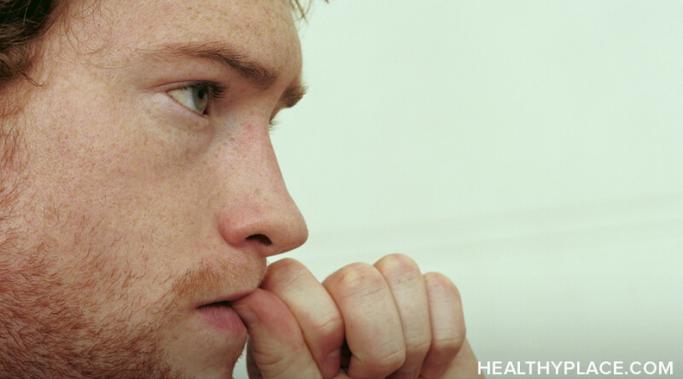Anxiety brings with it a seemingly endless list of struggles and frustrations. A very common frustration and, for me, incredibly bothersome is anxiety’s loud, unrelenting hyperactivity. The feeling of hyperactivity is sometimes related to anxiety's racing thoughts.
PD
When I am having a panic attack, I have a medication I take to help me calm down. I carry these prescribed pills with me and keep a supply in my house and car. I only take this medication when I am positive a panic attack is occurring. It is an acute treatment, not a daily regimen. As you’d expect, the panic and anxiety medication has side effects.
If physical health was truly the gold standard for living well, instead of just the perception, I would be the luckiest man in the world. In my adult life, I haven't had the sniffles for more than a couple days. Frankly, my biggest physical flaw is that, as a redhead, my skin burns when I pass a beach-themed vacation poster.
Reality and perception are very different things. While my physical health can be defined as "pretty good for a middle aged guy," my mental health is best described as "dude, where are your pants?"
Excessive worry doesn't feel good. Both our bodies and our minds experience it in often painful ways. Anxiety frequently causes the mind to fret over a problem. When we do that, we’re thinking about the problem itself rather than a solution for it, and the problem can become quite a monster. Our thoughts have run away with it and now blow it out of proportion, turning metaphorical little mole hills into gigantic mountains. Problems seem like catastrophes.
Panic attacks are brief episodes of very intense physical and emotional symptoms that can make someone afraid that he or she is losing control or even dying. In panic disorder, they seem to come out of nowhere, and this, people say, is often worse the the panic attack itself.
Do you have travel anxiety? Has anxiety affected your travel plans and/or preparations?
Traveling can bring up tons of worries: Will I be okay? What if something happens to people back home while I am away? What if I am alone and afraid? What if the plane crashes? What if it is overwhelming? What if I miss the plane, or hate my accommodations? What if I get lost? What if I am homesick, but stuck there? What if I can't get home? What if someone gets mad at me? What if I get anxious?
You name the worry, I have heard it and then some. All these worries just about make you want to stay home!
Ayurveda means "perfect knowledge" in Sanskrit. It is a traditional medicine from Ancient Indian. The sister of Yoga. (If you have never heard of Ayurveda, do a search and you'll find loads of information!)
The assumption in Ayurveda is that there are three elemental substances in the body called doshas. They are vata, pitta, and kapha. At each moment these doshas can be in states of aggravation cause emotional and physical health to be compromised. The treatment of Ayurveda seeks to pacify these doshas.
I was talking a client down from a panic attack on the phone last week and he was telling me what was freaking him out the most.
"I have to live with these thoughts. I will never be OK again."
This has got to be one of the scariest things that Anxiety does. It makes you look in the future and only see it staring you down. You mourn every event you might have in your future–that it will be fraught with this horrible feeling. Frankly, it makes you not want to have a future.
My son owns a tee shirt that says,
"When life hands you lemons, keep them. Because, you know, free lemons!"
I like to keep life light. But sometimes crises happen and they can set our anxiety on overdrive. Once panic sets it, it takes all of our energy. Energy that we need to handle the situation!
On the other hand, if we used that energy to handle the situation. It would make our anxiety go down! Really! Read on for Five Things To Do When You are In A Crisis:
Both of my kids get nervous. Yet all too often, they don't use nervous-describing words to state that they are nervous. Instead, they say, "I don't want to." And when asked why, they say, "I just don't want to." No reason.
Or else they say "I can't." And then, deparately try to convince me that they can't.
When they say, "I don't want to" do a chore, I get that there is a reason. I can agree. I don't like doing chores either. But when they say, "I just don't want to" go to a party when I know they always enjoy themselves at parties, this "I don't want to" is a telltale sign that they are nervous.







